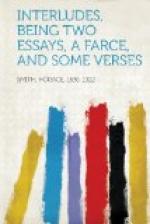This, it must be remembered, was written in 1865. Would Mr. Matthew Arnold be happier now with the Fortnightly and the Nineteenth Century and others? There is, I think, a good deal of truth in the passage I have just quoted. I think he might have allowed that, among so many writers, each advocating his own view or the view of his party or sect, we ought to have some chance of forming a judgment. A question seems to get a fair chance of being
“Set in all lights by many
minds
To close the interests of all.”
But, as I said, there is a good deal in what the writer says. The Daily News says the Government is all wrong, and the Daily Telegraph says it is all right; and if any paper ventured to be moderate it would go to the wall in a week. I think what he says is true, but there is no occasion to be so angry about it. We really are very thankful for such men as Carlyle, Ruskin, and Matthew Arnold, and I can’t help thinking they have had their proper share of praise, and have had their share of influence upon their age. The air of neglected superiority, which they assume, detracts not a little from the pleasure with which one always reads them.
Perhaps some of my conservative friends will regret the good old times in which criticism was really criticism, when a book had to run the gauntlet of a few well established critics of the club, or a play was applauded or damned by a select few in the front row of the pit. I agree to lament a past which can never return, but, on the whole, I think we are the gainers. Also, I very much incline to think that the standard of criticism is higher now than in the very palmy days when Addison wrote; or when the Edinburgh or Quarterly were first started. I incline to agree with Leslie Stephen in his Hours in a Library, that, if most of the critical articles of even Jeffrey and Mackintosh were submitted to a modern editor, he would reject them as inadequate; but I think that perhaps they excel our modern efforts in a certain reserve and dignity, and in a more matured thoughtfulness.




